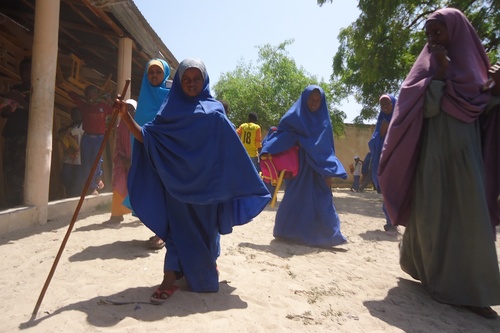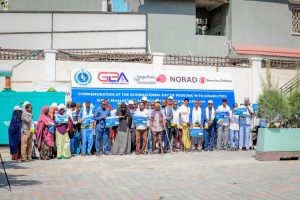Ma’alim Abdi, a father of 15 children, is one of the hundreds of thousands of people living with disabilities in Somalia. Besides enduring negative cultural stigma and risks of being caught in the crossfire in the capital Mogadishu, there are hardly adequate specialized social care services provided to disabled Somalis

“The only option I have now is to beg around. I am an old man and you see me crawling in the streets just to get basic food for my children,” Abdi says.
It is very risky to walk in the street where Abdi lives; speeding vehicles and people compete for space in the narrow roads, but he has to crawl in between them just to put food on the table.
The road he frequents nearby his residence has no traffic signs, not even a pedestrian crossing, let alone special signs that aid a disable person.
“I need a wheelchair; I cannot afford to buy one and I don’t know where to look for support, so I have to risk loitering around the shops to feed my children,” he added.
Despite the overwhelming local and international aid organizations working in southern and central Somalia, there is not a single one dedicated to supporting disabled people, only small, self-organized groups of disabled people advocating for their rights.
Feeling The Gap
Disabled people end up in the camps for internally displaced persons (IDPs) but are often faced with forced evictions by the government. Many of them fled to cities in search of food aid during the 2011 famine and have settled in old government buildings, where they are often evicted and end up resettling at the outskirts of the Mogadishu. This makes them more vulnerable than other IDPs as they are exposed to exploitation, rape, and poor living conditions.
“The disabled people are forgotten, the government does not provide any assistance but instead they victimize them by removing them from their make shift shelters,” said Mohamed Ali Farah, chairman of the Somali Disability Empowerment Network (SODEN), a local disability organization based in Mogadishu.
“We have been repeatedly calling on the UN and other international organizations to support us but all our requests have fallen into deaf ears,” Farah said.

Handicap International is aware of the situation in south and central Somalia, but has no concrete plans to start projects. But “this could change if the security situation significantly improves,” said Jeroen Stol, Program Director at Handicap International.
Despite the lack of international support, SODEN continues its work. “We don’t get tired of filling the gap and supporting ourselves,” Farah said.
Cultural Stigma
Disabled people in Somalia are discriminated against by the government, society, and even by their own families. Children with disabilities are isolated from playing with other children by their own parents.
“I have five children and one disabled one,” a mother of six children said; she counts her sixth son separately from the rest just because of his disability. “He doesn’t go to school and I don’t allow him to play with other children outside as they will hurt him or call him names.”
Somalis commonly give names to people according to their disabilities. These nicknames are so popular that people commonly accept them; one shopkeeper painted his shop as “Jeeri Shop” meaning “the shop of the limping guy” because he is known for walking with crutches.
Sometimes, those with physical impairments are associated with evil, as depicted in the old Somali adage that goes “Balaayo ama lug la’aatay ama il la’aatay!” which literally means, “An evil {person} is either missing a leg or an eye.”
“I personally witnessed one of the most depressing discrimination encounters when I had an appointment with a senior government officer in one of the hotels in Mogadishu. The security guards stopped me, while the rest of the people walked freely, leaving me behind on a wheelchair until another guard let me in after pleading with him,” said Farah of SODEN. “I raised the matter with the hotel management and the response I got broke my heart. They told me that the security guards thought I came there to beg so they didn’t want me to bother their customers.”
Although Farah is the head of an active civil society organization and advocates for the rights of the disabled people, because he is on a wheelchair, his ability is reduced to “a beggar.”
Accessibility
The public facilities such as schools, roads, and hospitals are not disability-friendly, therefore access to them is almost impossible. The few disabled children who manage to make it to school are faced with challenges that often lead to them being forced to drop out.
Safia at school. Photo credit: Moulid Hujale.
Nine-year old Safia is one of the exceptional students with a disability who endures discrimination and harassment in a school with not a single facility that meets her special needs. She goes to Kaaraan primary school, one of the government run schools in Mogadishu.
Pupils jump over her and push her aside on their way to the main gate as she slowly, shyly walks with the support of an old feeble walking stick.
According to the World Health Organization, 15 percent of the world’s population lives with some form of disability, but the figure is likely higher in Somalia due to the decades-long conflict and inadequate health services.
Last March, Amnesty International released a report calling on the Somali government to prioritize protection for people with disabilities.
Less than two weeks later, Somali President Hassan Sheikh Mohamud met with disability organizations, including SODEN, for the first time and discussed the challenges they face and how best to address them.
“We stressed the importance of having our rights in the constitution and encouraged the government to ratify UN convention on the Rights of People with Disabilities (UNCRPD),” Farah said.
“The president also promised to establish an office for disabled people and hold a national forum for Somalia disabilities. However, there have not been any signs of all the promises he made so far,” Farah said. “We need the government to take the matter seriously and make sure that the rights of disabled people are mainstreamed in all institutions and national policies.”
By: Moulid Hujale is a humanitarian journalist. He is on Twitter at @MoulidHujale.
http://www.refugeesinternational.org






